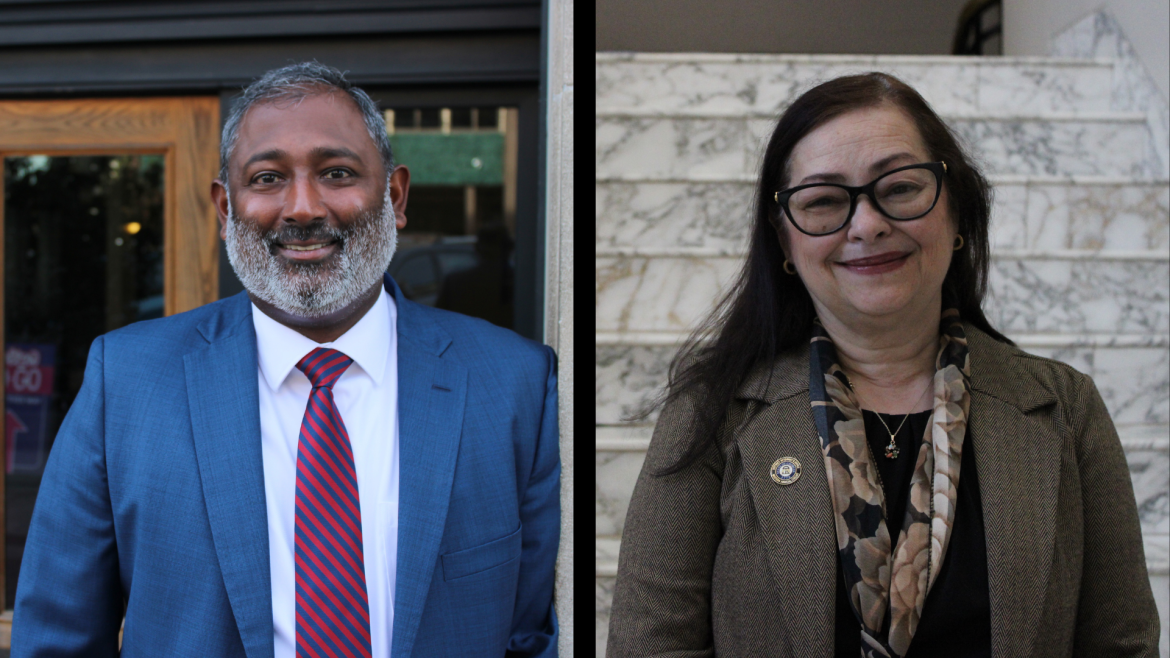Defense attorney Kalki Yalamanchili (left) and Western Judicial Circuit District Attorney Deborah Gonzalez (right) are shown. Photos by Wyatt Meyer
The Western Judicial Circuit, which comprises all of Athens-Clarke and Oconee Counties, will elect a district attorney on Nov. 5 — Election Day.
Incumbent District Attorney Deborah Gonzalez, a democratic candidate, won a closely contested race in 2020 and is running for a second term. Gonzalez is being challenged by local defense attorney Kalki Yalamanchili, an independent, who has more than 10 years of experience in criminal law, including five and a half years as Western Judicial Circuit Assistant District Attorney. News Editor Liza Larson and Editor-in-Chief Wyatt Meyer spoke to both candidates about why they’re running for office in 2024.
Q&A with Western Circuit District Attorney Deborah Gonzalez
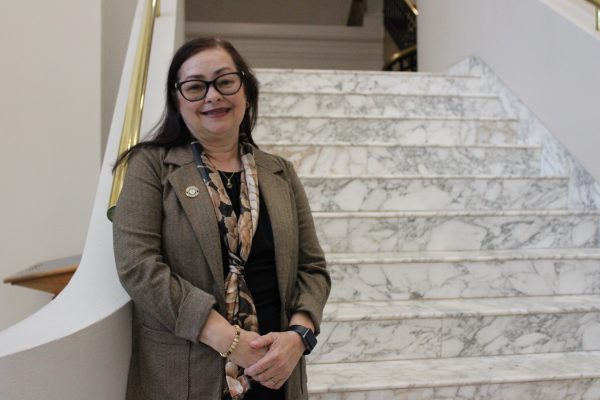
Western Judicial Circuit District Attorney Deborah Gonzalez stands in the lobby at the Western Judicial Circuit District Attorney office located at 325 E. Washington St. on Oct. 22.As District Attorney, Gonzalez has made ending the school-to-prison pipeline a priority by encouraging schools to provide more resources for students. “One of the things that we need in schools are more counselors and less school resource officers. We don’t need people walking around with guns and handcuffs to detain students. We need people who are going to be there to help students if something is happening, to get them the resources that they need,” Gonzalez said. Photo by Wyatt Meyer
Western Judicial Circuit District Attorney Deborah Gonzalez shares her progressive model and why she should be re-elected.
Q&A with Western Judicial Circuit District Attorney Deborah Gonzalez
News Editor Liza Larson: How did you get involved in law?
Western Judicial Circuit District Attorney Deborah Gonzalez: It was actually my mother’s dream, and she never got to pursue that. I got an opportunity to go to law school and got a scholarship, an opportunity for an education. That’s how it started and then as I got into it, (I) started enjoying the different parts of the legal profession, like the research and analysis (and) being able to help people through those skills that you bring.
LL: You were the first female, minority District Attorney in your circuit, and then the first female Puerto Rican District Attorney in the country. How do those firsts make you feel?
DG: Well, you don’t run to be first, you run because you think, ‘I can help my community.’ There should have been others before me, but there weren’t. So, there is a sense of responsibility when you’re the first that you’re not the last. It is really important to be out there in the community so that women, young girls, Latinos, African Americans, people in the minority community can get to see somebody who looks like them, somebody who shares their values, somebody who grew up in the same way that they did, so that they know they can do it too. You can be a lawyer, you can be a judge, you can be the (District Attorney) because you see that I’ve done it. (It is) about encouraging the next generation to reach farther than maybe any of their family had ever reached before.
“People get really excited about the local (elections) because they know the people, there’s a one-on-one relationship many times that they do not get with the presidential (elections).”
— Deborah Gonzalez,
Western Judicial Circuit District Attorney
LL: What does community outreach look like for you?
DG: The research is very clear: the more community engagement you have, the safer the community that you have. I created a Community Outreach Division, and what they do is they serve as the liaison between the community and the (District Attorney) office, so they’re out there at resource fairs, giving information about the court system. Many people have no idea how this works and so we make it a real priority to educate people. The other way that we get to help people, and why community outreach is so important, is the partnerships that we get. We want to prevent young people from getting system-involved in the first place so the partnerships that we have with youth organizations (are very important).
LL: What is it like to work in a state job in this very politically-charged time?
DG: You have to be very good at being able to compartmentalize and distance. We have a job to do, and so while I’m here in the office, we’re going to do that job, and we’re going to focus on that job. I do not read comments on Facebook or Reddit or any of those kinds of things, because those are distractions. It’s a shame that there’s so much misinformation out there. Social media is very easy to put up anything and still remain anonymous and behind the screen, and then not be held accountable for what you actually write. There’s a lot of misinformation and a lot of critical thinking skills that are not being utilized as to what’s happening in these particular races.
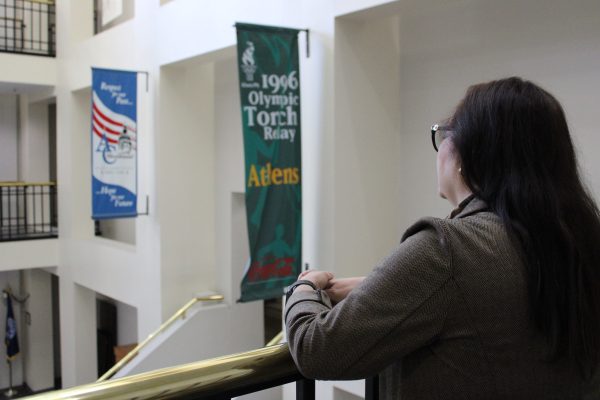
Western Judicial Circuit District Attorney Deborah Gonzalez looks over the lobby at the Western Judicial Circuit District Attorney office located at 325 E. Washington St. on Oct. 22. Gonzalez served as a Georgia State Representative before running and winning the previous District Attorney election in 2020. “When I finished there, people came to me and said, “We have had two (District Attorneys) in 48 years. We need to change,” Gonzalez said. Photo by Wyatt Meyer
LL: Why do you think it’s important for Athens community members to participate in local elections?
DG: Local drives national. People get really excited about the local (elections) because they know the people, there’s a one-on-one relationship many times that they do not get with the presidential (elections). On the local side, there are people that know me and know my opponent, and want to support us in that way, or feel really strongly about how justice is going to look in their community, and this is the way that they can make a difference and impact what that justice is going to look like. So, local (and) national actually work together in order to get the voter turnout and in order to get people excited about voting, and in order to also have people feel good about the vote that they make.
LL: How can you verify that we keep going in the right direction?
DG: (The District Attorney Office is) working with the Justice Innovation Lab so that they can do a deep dive into our data so that we can see whether it is working. Sometimes, you can put in a policy thinking with the best of intentions that this is what’s going to work, and then discover through the results that it’s not. So, we’re actually in that process now with them being able to look at our data and see, ‘Did these policies give us the results that we thought we were going to?’ But, that takes analysis and time and resources to get them there and we don’t have extra resources in our budget. We have a very,very lean budget, so we have had to go and find these organizations like the Justice Innovation Lab who can get a grant to then do that work for us.
LL: If you are re-elected, what do you hope to do in your second term?
DG: My goals are to expand on the great foundation that we started. So, for example, I have a restorative justice program for juveniles (and) I’d like to expand that to the emerging adult population, meaning from 17 to 24. That is something that I would love to do. I would love to get us a Special Victims Unit. We’re going to continue to have all of our victim advocates go through their training to be certified. We started that process this year (and) we have two certified so far. So, we have all of these goals of expanding on things that we have already started and put in place, and (we want to make them) more sustainable and expand them.
Q&A with defense attorney Kalki Yalamanchili
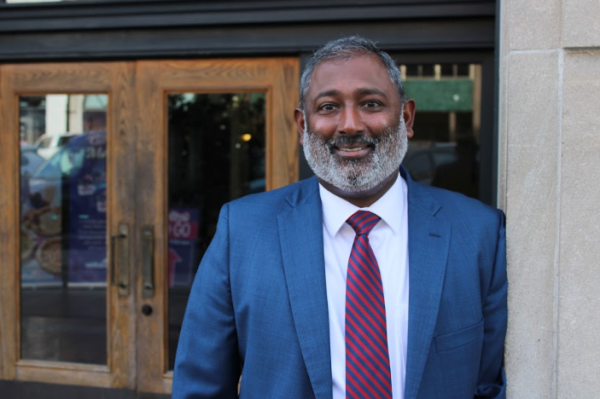
Local defense attorney Kalki Yalamanchili, a candidate for Western Judicial Circuit District Attorney, stands outside of his office at 320 E. Clayton St. One of Yalamanchili’s main campaign points is increased use of pre-trial diversion programs. “There are lots of cases where not seeking a conviction, but connecting that person with resources, monitoring their progress through those treatment resources and ensuring that there’s a period of time where they don’t get into any other kind of trouble,” Yalamanchili said. Photo by Wyatt Meyer
Western Judicial Circuit District Attorney Candidate Kalki Yalamanchili shares his passion for law and reasoning behind running for district attorney.
News Editor Liza Larson: How did you get involved in law?
Candidate for Western Judicial Circuit District Attorney Kalki Yalamanchili: Actually, when I came here to the University of Georgia for undergrad, I thought I wanted to go to medical school. Both my parents were physicians. (It had) been something that I had been around through our family in general. Then, when I got here, I realized my passion wasn’t in those science classes I was taking, and I took a couple of legal classes and I really enjoyed those the most. So, I switched my major from biology to political science and decided I wanted to go to law school. When I went to law school, I thought I wanted to be an appellate lawyer, handling cases that have finished the trial stage and are being appealed to court to review the result that occurred at the trial court. But then, while I was in law school, I had an opportunity to intern at the district attorney’s office back at my hometown (of) Albany, (Georgia), and I got an opportunity to really do trial work, serve victims of crime. That hooked me. That’s really where my passion was – being in a courtroom, not reading transcripts.
LL: Why did you want to run for District Attorney in Athens?
KY: I worked as a prosecutor for the first six years of my legal career, including five and a half years at the (district attorney) office here in Athens doing felony prosecutions. I’ve worked as a criminal defense attorney for six years. Being on both sides of that, I’ve been able to see the incredible positive impact a well-run district attorney’s office can have on the community that it’s serving. Then on the flip side, you also see the level of harm that can be done. What we have right now is essentially a non-functioning district attorney’s office, and knowing that I’ve got the background and the experience to make that difference led me to make the decision that I wanted to run. This community can have not just a minimally adequate or barely functioning (district attorney) office. We can have one of the best district attorney’s offices in the state of Georgia, and I think I can be a part of building that office.
LL: You’ve described the current district attorney’s office as ineffective. If you are elected, how do you plan to change that?
KY: It comes from a place of leading from experience. I’ve successfully tried every kind of case, from a DUI to a murder, to a jury. One of the issues is that we’re in the staffing position that we’re in right now, where you have an office that is only about 60% staffed, with people who don’t have any kind of significant felony trial experience is because people want to be led by people who have been in the situations where they are and have been successful in those situations. Changing that structure and getting it back to where courtrooms have an experienced attorney that can help the younger attorneys.
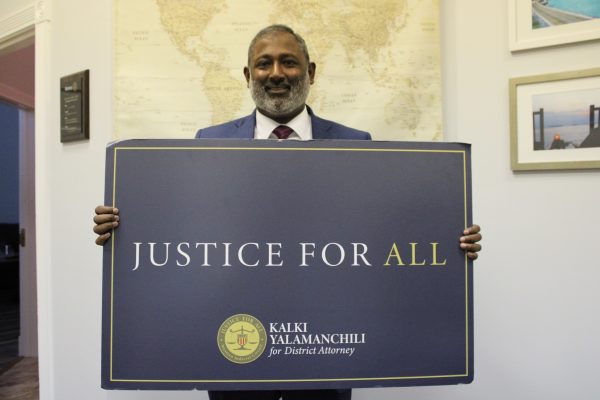
Local defense attorney Kalki Yalamanchili, a candidate for Western Judicial Circuit District Attorney, displays his campaign sign and slogan: “Justice For All” in his office on Oct. 31. The slogan resonated with Yalamanchili because of his impact-minded justice philosophy. “Justice for all is a campaign slogan (that has) probably been used by hundreds of prosecutors and judges over the years, but part of what that means to me is delivering for victims, especially in most serious, violent felony cases,” Yalamanchili said. Photo by Wyatt Meyer
LL: In a presidential election year, why do you think it’s important for Athens community members to engage in the district attorney election also?
KY: The (district attorney’s) office deals with some of the most critical issues that come up when crimes are committed. These local elections will have a more direct impact on our day-to-day lives than a national election will, (so) making a conscious decision to put somebody in that office who we think has the training and experience to do the job. We owe that to each other as a community, and so I really encourage people to look at the issues on an individual level, look at what’s been promised versus what’s been delivered, and look at putting experience into the office so that we get better results for everybody involved in the process. You can help a lot of people, but you can also hurt a lot of people if you don’t do it the right way.
Editor-in-Chief Wyatt Meyer: You talk a lot about common sense prosecution on your website. What does common sense prosecution look like for you?
KY: It’s just common sense to use programs that will try to get at those root issues. That’s a lot of what I mean in that manner – where we prioritize our resources and how we use our trial resources. One of the reasons I’ve decided to run as an independent is (because) I really do believe a (district attorney’s) office isn’t a place for partisan politics. It should be a place for public service. When we talk about it in common sense terms, rather than political terms, people can come together. That’s a benefit to the community, because then you’ve got a broad coalition that has a broader spectrum of resources to bring to bear. We can bring together a broader coalition and talk about it in terms of common sense solutions that most people agree on, as opposed to terms of political views.
WM: How would you being district attorney affect justice for high schoolers?
KY: We want to make sure that juvenile court is a place where juveniles’ best interests are the driving force behind what the resolution of the case should be. We want to make sure we include programs that can help kids who may have gotten in trouble get not just court resources, but better relationships. One of the worst things you can talk about when you are a prosecutor is a situation where you’re putting a kid in a cell because of the seriousness of a crime that was committed or a situation where there’s a kid who got seriously injured or killed because they’re hanging out with the wrong people in the wrong place at the wrong time in ways that aren’t healthy or beneficial for them. For me, I want to lead an office that focuses on those areas when it comes to interactions with young people.
“ One of the reasons I’ve decided to run as an independent is (because) I really do believe a (district attorney’s) office isn’t a place for partisan politics. It should be a place for public service. ”
— Kalki Yalamanchili,
Local defense attorney and candidate for Western Judicial Circuit District Attorney
LL: You’ve been upfront about your motivations, your faith and your family throughout our discussion and on your platform. Why do you think that’s appealing to the community?
KY: This really is a place where people care about each other, I firmly believe that. Post-COVID, you saw places just nosedive in participation, but not here. Those institutions are healthy, because I think this is a place where people are very connected and they care about each other. When people see that you’re coming at it from a perspective of talking about the things that connect us in ways that we can be together and achieving goals that we all agree on, as opposed to talking about it in ways of, ‘Us against them,’ people are ready, especially at the local level, to talk about solutions together, not talk about how we can divide ourselves into teams that are somehow in battle. Everybody wants a safer community, everybody wants a fairer community, everybody wants to live in a place where they can feel like and know that the law is being applied equally and fairly to all people.
